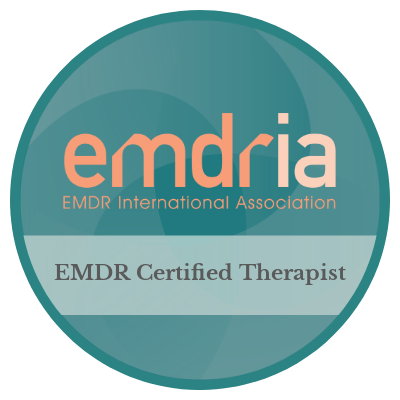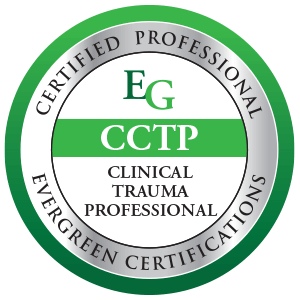Traumatic Stress/EMDR

A study in 2015 revealed that 70% of American adults identify that they have experienced at least one traumatic event in their lifetime. Of the individuals who seek out therapy services, over 90% have experienced traumatic events. Furthermore, for two years all of us have been in a traumatic episode of the global pandemic. While individual experiences have varied widely, everyone has experienced the impact and stress of the pandemic in some way. Traumatic stress is an umbrella term which encompasses our brain and body’s reaction to life events. For most of us when we experience a major traumatic event such as divorce, natural disaster, death or disease, our existing coping mechanisms are outmatched by the experience and we suffer acute stress.
Our work together can help you decrease numbing behaviors, negative thoughts, negative feelings and improve your resiliency to life. The primary modality I use in working with traumatic stress is EMDR. You can watch this video to learn more about EMDR.
National Council for Behavioral Health
This can take on the form of mental, emotional and physical symptoms that persist for weeks or months after the event is over. I work with women who have recently experienced a traumatic event and help them return to a sense of normal. This is a crucial time to receive support because if we do not address acute stress properly it can turn into a more chronic pattern of PTSD.
I also work with women who have experienced traumas in the distant past and who have been feeling chronically anxious, depressed, out of control and/or hopeless. PTSD is when our brains and bodies become locked into a stress reaction. The traumatic event is over but we continue to react as if it is still happening today. Perhaps you cannot remember the last time you did not feel anxious or depressed. Or perhaps your body being in stress for so many years has created health issues. Or perhaps you have turned to compulsive behaviors to escape or numb the pain such as over drinking, over eating, perfectionism, codependency, dieting, binge watching TV and more. Our work together can help you decrease numbing behaviors, negative thoughts, negative feelings and improve your resiliency to life.
Traumatic stress is far less about the actual event and much more about how your brain and body processed it in the moments, weeks, months or years after. It is complex and highly unique to the individual and my approach is to develop an individualized plan to resolve stressful life experiences so they stop negatively affecting you and your life today. Many of the clients I work with have chronic health issues relating to the years of being under traumatic stress. Our work together will support your entire recovery physically, mentally and emotionally.
One of my specialities is helping heal C-PTSD or Complex Developmental Trauma. C-PTSD refers to traumatic events that occurred while our brains and bodies were still developing (under the age of 24). Given the timing and nature of these events they can have a significant impact on our development. Our road to recovering from trauma happens in three phases.
The first or Foundational Phase has three goals: education, skill building and identification. My education focus is to help you understand your own traumatic stress responses and to learn what category of traumatic stress fits you. Next we focus on enhancing your skills and strategies so that you can better manage symptoms and stressors. Finally we make a plan for how we are going to address the traumatic events that are still affecting you. This phase is highly tailored to the individual and will have more emphasis on different goals based on your needs.
The second or Processing Phase has two main goals which is to desensitize your system and to reprocess events. Again this is highly customized to your needs but in this phase we are helping your brain and body change the flight/fight/freeze response and turning the volume down on stressful situations or memories. At this point, I would like to address the two biggest concerns I hear from prospective clients about this phase of our work. Firstly, clients may not have experienced more obvious forms of trauma such as abuse or death. Traumatic events take on many forms outside of major, obvious traumas and often times our brains and bodies have filed an event as traumatic without our awareness. Traumatic stress is far less about the actual event and much more about how your brain and body processed it in the moments, weeks, months or years after. Secondly, many clients do not have memories and therefore are confused about how they would complete this phase. Rest assured that specific concrete memories are not a prerequisite to successfully process past events. As you will learn in phase one, not having memories or having only memory fragments is actually a normal occurrence for trauma memories.
The third or Integration Phase is when breakthroughs happen. This phase is when your psyche and body resolve the trauma and you are freed from traumatic stress. In this phase women experience renewed hope, joy and freedom from symptoms and reactions. Painful parts of history that you previously tried to hide, bury or ignore become another piece of the beautiful mosaic that is you. New meaning and acceptance emerges. This is when you get to reap the benefits of your hard work and commitment to healing!









